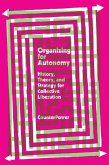15,99 €
inkl. MwSt.
Versandfertig in über 4 Wochen

8 °P sammeln
- Broschiertes Buch
- Merkliste
- Auf die Merkliste
- Bewerten Bewerten
- Teilen
- Produkt teilen
- Produkterinnerung
- Produkterinnerung
A radical critique of political correctness that puts the pleasure back in politics.
Andere Kunden interessierten sich auch für
![Social Anarchism or Lifestyle Anarchism Social Anarchism or Lifestyle Anarchism]() Murray BookchinSocial Anarchism or Lifestyle Anarchism12,99 €
Murray BookchinSocial Anarchism or Lifestyle Anarchism12,99 €![An Anarchist Faq: Volume 1 An Anarchist Faq: Volume 1]() Iain McKayAn Anarchist Faq: Volume 128,99 €
Iain McKayAn Anarchist Faq: Volume 128,99 €![Anarchism and Its Aspirations Anarchism and Its Aspirations]() Cindy MilsteinAnarchism and Its Aspirations16,99 €
Cindy MilsteinAnarchism and Its Aspirations16,99 €![Anarchism and Other Essays Anarchism and Other Essays]() Emma GoldmanAnarchism and Other Essays15,99 €
Emma GoldmanAnarchism and Other Essays15,99 €![The Unabomber Manifesto The Unabomber Manifesto]() FcThe Unabomber Manifesto10,99 €
FcThe Unabomber Manifesto10,99 €![This Is Not a Program This Is Not a Program]() TiqqunThis Is Not a Program12,99 €
TiqqunThis Is Not a Program12,99 €![Organizing for Autonomy Organizing for Autonomy]() CounterPowerOrganizing for Autonomy22,99 €
CounterPowerOrganizing for Autonomy22,99 €-
-
-
A radical critique of political correctness that puts the pleasure back in politics.
Hinweis: Dieser Artikel kann nur an eine deutsche Lieferadresse ausgeliefert werden.
Hinweis: Dieser Artikel kann nur an eine deutsche Lieferadresse ausgeliefert werden.
Produktdetails
- Produktdetails
- Verlag: AK Press
- Seitenzahl: 220
- Erscheinungstermin: 5. Dezember 2017
- Englisch
- Abmessung: 162mm x 111mm x 25mm
- Gewicht: 242g
- ISBN-13: 9781849352888
- ISBN-10: 1849352887
- Artikelnr.: 47747391
- Herstellerkennzeichnung
- Libri GmbH
- Europaallee 1
- 36244 Bad Hersfeld
- gpsr@libri.de
- Verlag: AK Press
- Seitenzahl: 220
- Erscheinungstermin: 5. Dezember 2017
- Englisch
- Abmessung: 162mm x 111mm x 25mm
- Gewicht: 242g
- ISBN-13: 9781849352888
- ISBN-10: 1849352887
- Artikelnr.: 47747391
- Herstellerkennzeichnung
- Libri GmbH
- Europaallee 1
- 36244 Bad Hersfeld
- gpsr@libri.de
Carla Bergman: Carla Bergman has worked with youth in alternatives-to-education projects for over fifteen years. She co-directed the film: Common Notions: Handbook Not Required and co-edited the Stay Solid: A Radical Handbook For Youth. Nick Montgomery: Nick Montgomery is an organizer and writer currently finishing a PhD in Cultural Studies at Queen's University. His work focuses on alternatives to the capitalism, gender violence, settler colonialism, and ecological degradation. Hari Alluri: Hari Alluri, an award-winning poet, educator, and teaching artist, is the author of Carving Ashes (2013), The Promise of Rust (2016), and The Flayed City (2017)
Introduction
Intro to intro
Questions
Affirmative theory
Joy and the Spinozan current
Joyful militancy and emergent powers
Beyond optimism and pessimism
On anarchism
The beginning of a conversation
Structure of the book Chapter 1: Empire, Militancy and Joy
Resistance and joy are everywhere
Sadness and subjection
Joy is not happiness
The power of joy
Militant about joy
Starting from where people find themselves Chapter 2: Friendship, freedom, ethics
Introduction
Friendship is the root of freedom
From morality to ethics
What can friendship do?
Solidarity begins at home
The ethics of affinity in anarchism
Connecting Spinozan current to Indigenous resurgence
Friendship and freedom have sharp edges
The active shaping of our worlds together Chapter 3: Trust and Responsibility as Common Notions
Trust and responsibility as common notions
(Mis)trust and (ir)responsibility under Empire
Empire's radical monopoly over life
Towards conviviality
Emergent trust and responsibility: three examples
Indigenous struggles
Anti
violence and transformative justice
Deschooling and youth liberation
The power of baseline trust
Infinite trust and responsibilities?
Holding common notions gently Chapter 4: Rigid Radicalism
Introduction
It's those people
The paradigm of government
Decline and counterrevolution
The perils of comparing
Having good politics Chapter 5: Sources of Rigid Radicalism, Sources of Joy
Introduction
Ideology
Ideology in Leninism
Ideology in anarchism
Critique of ideology as such
Undoing ideology
Morality, fear, and ethical attunement
Christian origins of morality
Morality in movements
Warding off morality with common notions
You're so paranoid, you probably think this section is about you
Lack
finding, perfectionism, schooling, walking
Radical perfectionism and paranoid reading
Holding ambivalence
The limits of critique: from paranoia to potential
Towards new encounters Outro
Rigid radicalism can be hard to talk about
Three modes of attunement Appendix 1: Feeling Powers Growing Within Yourself: An Interview with Silvia Federici Appendix 2: Breaking down the walls around each other: the transformative power of trust
An Interview with Kelsey Cham Corbett Glossary of Terms Acknowledgements Bibliography
Intro to intro
Questions
Affirmative theory
Joy and the Spinozan current
Joyful militancy and emergent powers
Beyond optimism and pessimism
On anarchism
The beginning of a conversation
Structure of the book Chapter 1: Empire, Militancy and Joy
Resistance and joy are everywhere
Sadness and subjection
Joy is not happiness
The power of joy
Militant about joy
Starting from where people find themselves Chapter 2: Friendship, freedom, ethics
Introduction
Friendship is the root of freedom
From morality to ethics
What can friendship do?
Solidarity begins at home
The ethics of affinity in anarchism
Connecting Spinozan current to Indigenous resurgence
Friendship and freedom have sharp edges
The active shaping of our worlds together Chapter 3: Trust and Responsibility as Common Notions
Trust and responsibility as common notions
(Mis)trust and (ir)responsibility under Empire
Empire's radical monopoly over life
Towards conviviality
Emergent trust and responsibility: three examples
Indigenous struggles
Anti
violence and transformative justice
Deschooling and youth liberation
The power of baseline trust
Infinite trust and responsibilities?
Holding common notions gently Chapter 4: Rigid Radicalism
Introduction
It's those people
The paradigm of government
Decline and counterrevolution
The perils of comparing
Having good politics Chapter 5: Sources of Rigid Radicalism, Sources of Joy
Introduction
Ideology
Ideology in Leninism
Ideology in anarchism
Critique of ideology as such
Undoing ideology
Morality, fear, and ethical attunement
Christian origins of morality
Morality in movements
Warding off morality with common notions
You're so paranoid, you probably think this section is about you
Lack
finding, perfectionism, schooling, walking
Radical perfectionism and paranoid reading
Holding ambivalence
The limits of critique: from paranoia to potential
Towards new encounters Outro
Rigid radicalism can be hard to talk about
Three modes of attunement Appendix 1: Feeling Powers Growing Within Yourself: An Interview with Silvia Federici Appendix 2: Breaking down the walls around each other: the transformative power of trust
An Interview with Kelsey Cham Corbett Glossary of Terms Acknowledgements Bibliography
Introduction
Intro to intro
Questions
Affirmative theory
Joy and the Spinozan current
Joyful militancy and emergent powers
Beyond optimism and pessimism
On anarchism
The beginning of a conversation
Structure of the book Chapter 1: Empire, Militancy and Joy
Resistance and joy are everywhere
Sadness and subjection
Joy is not happiness
The power of joy
Militant about joy
Starting from where people find themselves Chapter 2: Friendship, freedom, ethics
Introduction
Friendship is the root of freedom
From morality to ethics
What can friendship do?
Solidarity begins at home
The ethics of affinity in anarchism
Connecting Spinozan current to Indigenous resurgence
Friendship and freedom have sharp edges
The active shaping of our worlds together Chapter 3: Trust and Responsibility as Common Notions
Trust and responsibility as common notions
(Mis)trust and (ir)responsibility under Empire
Empire's radical monopoly over life
Towards conviviality
Emergent trust and responsibility: three examples
Indigenous struggles
Anti
violence and transformative justice
Deschooling and youth liberation
The power of baseline trust
Infinite trust and responsibilities?
Holding common notions gently Chapter 4: Rigid Radicalism
Introduction
It's those people
The paradigm of government
Decline and counterrevolution
The perils of comparing
Having good politics Chapter 5: Sources of Rigid Radicalism, Sources of Joy
Introduction
Ideology
Ideology in Leninism
Ideology in anarchism
Critique of ideology as such
Undoing ideology
Morality, fear, and ethical attunement
Christian origins of morality
Morality in movements
Warding off morality with common notions
You're so paranoid, you probably think this section is about you
Lack
finding, perfectionism, schooling, walking
Radical perfectionism and paranoid reading
Holding ambivalence
The limits of critique: from paranoia to potential
Towards new encounters Outro
Rigid radicalism can be hard to talk about
Three modes of attunement Appendix 1: Feeling Powers Growing Within Yourself: An Interview with Silvia Federici Appendix 2: Breaking down the walls around each other: the transformative power of trust
An Interview with Kelsey Cham Corbett Glossary of Terms Acknowledgements Bibliography
Intro to intro
Questions
Affirmative theory
Joy and the Spinozan current
Joyful militancy and emergent powers
Beyond optimism and pessimism
On anarchism
The beginning of a conversation
Structure of the book Chapter 1: Empire, Militancy and Joy
Resistance and joy are everywhere
Sadness and subjection
Joy is not happiness
The power of joy
Militant about joy
Starting from where people find themselves Chapter 2: Friendship, freedom, ethics
Introduction
Friendship is the root of freedom
From morality to ethics
What can friendship do?
Solidarity begins at home
The ethics of affinity in anarchism
Connecting Spinozan current to Indigenous resurgence
Friendship and freedom have sharp edges
The active shaping of our worlds together Chapter 3: Trust and Responsibility as Common Notions
Trust and responsibility as common notions
(Mis)trust and (ir)responsibility under Empire
Empire's radical monopoly over life
Towards conviviality
Emergent trust and responsibility: three examples
Indigenous struggles
Anti
violence and transformative justice
Deschooling and youth liberation
The power of baseline trust
Infinite trust and responsibilities?
Holding common notions gently Chapter 4: Rigid Radicalism
Introduction
It's those people
The paradigm of government
Decline and counterrevolution
The perils of comparing
Having good politics Chapter 5: Sources of Rigid Radicalism, Sources of Joy
Introduction
Ideology
Ideology in Leninism
Ideology in anarchism
Critique of ideology as such
Undoing ideology
Morality, fear, and ethical attunement
Christian origins of morality
Morality in movements
Warding off morality with common notions
You're so paranoid, you probably think this section is about you
Lack
finding, perfectionism, schooling, walking
Radical perfectionism and paranoid reading
Holding ambivalence
The limits of critique: from paranoia to potential
Towards new encounters Outro
Rigid radicalism can be hard to talk about
Three modes of attunement Appendix 1: Feeling Powers Growing Within Yourself: An Interview with Silvia Federici Appendix 2: Breaking down the walls around each other: the transformative power of trust
An Interview with Kelsey Cham Corbett Glossary of Terms Acknowledgements Bibliography







